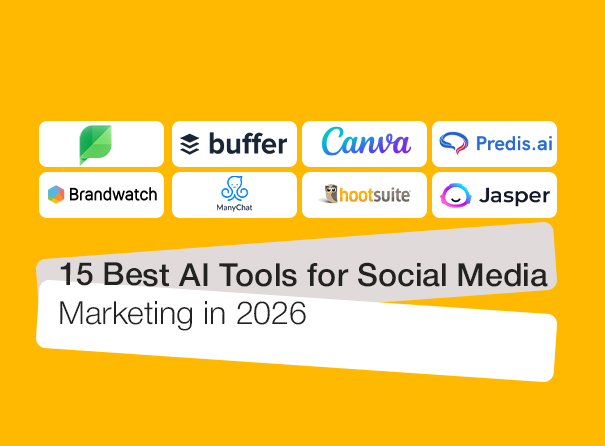TLDR: - Social media search is evolving from simple text queries to more advanced methods like voice search, visual search, and AI-powered discovery. Voice search demands conversational, long-tail keywords and strong local SEO. Visual search requires optimized, high-quality images with detailed metadata. AI search engines personalize results, predict trends, and enable multimodal searches combining voice, image, and text. To stay visible, brands need to produce intent-driven, authentic, and diverse content while adapting to platform innovations and prioritizing ethical practices.
The manner in which people search for content via social media is evolving. In addition to text based searching, users currently have other ways of finding what they require. Through voice assistants, image tools, and AI recommendations, it is quicker and easier to locate information. Marketers need to take a different approach in order to rethink the way they produce, distribute, and optimize content.
In addition to keywords, elements such as context of the user and intent become more relevant in present-day searching. Searching has turned into a more sophisticated, fast, and interactive process. Whether a person searches using Alexa to locate a café, snaps a photo of a product they desire, or scrolls through AI-curated feeds, brands must adapt to remain seen and heard in this landscape.
If your objective is to maintain your presence in the future, investing in social media optimization services is crucial. This is important in order to remain competitive within this evolving environment.
From Text to Voice
Voice search is turning out to be one of the significant trends in online marketing. Owing to the popularity of voice assistants such as Siri, Alexa, and Google Assistant, individuals now pose complete questions rather than utilizing brief keywords. Search in a conversational style is now the new norm.
A customer can now ask, "Where is the best coffee around me now?" instead of simply typing "best coffee shop around me." This shift brings into focus the demand for long-tail, question-type keywords that are naturally phrased. Marketers are required to create content that resembles how one speaks naturally.
Additionally, this shift alters the process of SEO. Targeting a single keyword alone is no longer sufficient for voice search optimization. Now, user intent and clear, concise answers need to be the focus and have the capability to appear in voice assistant responses or featured snippets. Local voice searches, i.e., "nearest gym" or "pet-friendly restaurant nearby," are common. So local SEO is more crucial than ever. Businesses must employ location-specific keywords, have an up-to-date Google Business Profile, and have their local listings updated. Mobile optimization is another factor of importance. Brands require swift, mobile-optimized sites that provide a seamless user experience. The majority of voice queries occur on mobile phones. If companies don't adopt, they will lose potential customers searching while on the go.
Visual Search and Image Recognition
Social media sites such as Pinterest, Instagram, and TikTok are increasingly focusing on visual content, fueling the rise of visual search. Consumers now rely on pictures, not texts, to discover what they're looking for. Google Lens, Pinterest Lens, Snapchat Scan, and Amazon's Camera Search are just a few examples of tools that enable consumers to snap or upload images to instantly discover connected products or information.
This change is revolutionizing the way consumers shop, travel, and engage with brands. For instance, a consumer can snap a photo of a shoe and easily locate where to purchase it online. In order to be visible in this environment, brands must prioritize image optimization.
This includes the use of original, high-quality images, descriptive alt text, and correct metadata corresponding to the content surrounding it. These allow search engines to know what an image is about and relate it to the appropriate audience. In addition to optimization, brands need to adopt image-centric content strategies. Visual-led platforms value innovative, one-of-a-kind, and eye-catchy content. High-definition images, captivating videos, and dramatic graphics are as crucial for SEO as words. Check out this blog to gain insights on how to outsmart algorithm changes and boost organic reach.
AI-Powered Discovery
Artificial intelligence has transitioned from being a behind-the-scenes tool to becoming an integral aspect of how individuals find content. AI algorithms sift through massive streams of data in real time, tailoring what people see to their behavior, interests, and where they are. This has created more personalized discovery than ever.
AI helps brands generate very personalized recommendations so that no two user feeds are identical. Marketers, in turn, will need to become even more targeted in audience segmentation and content strategy if they hope to remain relevant. AI also offers predictive intelligence by detecting future trends before the masses catch on. Brands that take action on these insights early on can remain ahead of the competition.
An exciting new trend in this space is multimodal search. This integrates voice, text, and image queries into a single query. Picture taking a photo of a coat and searching, "Where can I find this locally?" in order to get instant local search results. This kind of search is already emerging on sites like Google and Amazon, revolutionizing the way consumers engage with brands.
Additionally, AI simplifies marketing processes. From the automation of ad placements and audience targeting to content moderation, AI tools enable marketers to concentrate on strategy and creativity.
Why User Intent Matters More Than Ever
Whether users are typing, talking, or snapping pictures, the primary factor of discovery is user intent. Context and intent behind a search query matter more than individual words. Marketers need to produce content that responds to questions while projecting ahead to meet user needs.
For instance, a user looking for "best laptops" might just be interested in comparing attributes, whereas another user hunting for "best laptop for under $800 for students" has a more defined purchasing intent. Knowing these variations enables brands in customizing content to fulfill user intentions.
Content Strategies for the New Search Era
In this new landscape of search, content strategies of the old kind are not enough. Brands must shift to new approaches that cater to user expectations. First, focusing on quality and authenticity is crucial. Algorithms favor content that resonates as real and delivers true value. Clickbait strategies may create short-term engagement peaks, but sustainable growth needs to be built on trust and substance.
Second, diversification is crucial. With search options from voice to visuals, brands have to experiment with different formats such as short videos, carousels, live streams, podcasts, and interactive polls. Catering to different tastes ensures greater reach and higher engagement.
Third, it is important to keep oneself updated on platform developments. Social media platforms are constantly adjusting algorithms and discovery mechanisms. Brands that quickly shift their approaches will stay in the limelight. Comparing various platforms can help determine what platforms require more attention.
Lastly, brands need to recognize the increasing significance of ethics in content creation. Being open about data usage and being responsive to algorithmic bias is essential. Brands that prioritize ethical, user-led practices build more resilient and enduring connections with their audience.
To delve into crafting meaningful engagement in this evolving environment, this breakdown of social media success underscores the importance of real interactions over vanity metrics.
Ethical Issues in AI-Powered Search
As search becomes increasingly dependent on AI, users are looking more carefully at fairness and privacy. Data misuse, targeted marketing, and algorithmic bias are becoming concerns. To remain credible, brands must have transparent and open practices. That means being honest about data collection, not using manipulative targeting, and inclusive representation in content.
Final Thoughts
The future of social media search is more than typing keywords. It is talking naturally, using pictures, and engaging with AI-powered suggestions that are personalized and feel human. The shift challenges marketers with new and exciting opportunities to engage with audiences.
Those brands that are able to pivot and optimize their sites for voice search, invest in visual content, and apply AI insights will remain discoverable and fresh in this rapidly shifting landscape. Those that do not will find themselves falling behind.
At Inqnest, we specialize in helping brands navigate this new age of discovery. Whether that means optimizing for voice search, visual searchability, or bringing in AI-driven insights into strategy, we make sure your brand is future-ready.
Want to future-proof your social media strategy? Let’s make your content easier to find, engaging, and aligned with the way people search today.











.png)












.png)
.png)
.png)

.png)
